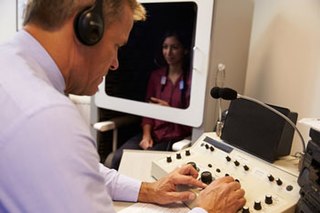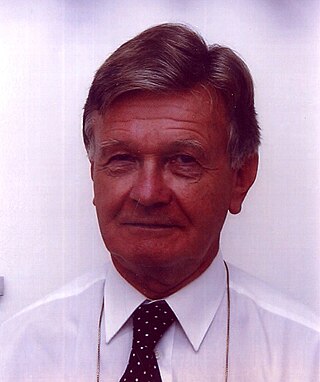
Hearing loss is a partial or total inability to hear. Hearing loss may be present at birth or acquired at any time afterwards. Hearing loss may occur in one or both ears. In children, hearing problems can affect the ability to acquire spoken language, and in adults it can create difficulties with social interaction and at work. Hearing loss can be temporary or permanent. Hearing loss related to age usually affects both ears and is due to cochlear hair cell loss. In some people, particularly older people, hearing loss can result in loneliness. Deaf people usually have little to no hearing.

A cochlear implant (CI) is a surgically implanted neuroprosthesis that provides a person who has moderate-to-profound sensorineural hearing loss with sound perception. With the help of therapy, cochlear implants may allow for improved speech understanding in both quiet and noisy environments. A CI bypasses acoustic hearing by direct electrical stimulation of the auditory nerve. Through everyday listening and auditory training, cochlear implants allow both children and adults to learn to interpret those signals as speech and sound.

Deaf culture is the set of social beliefs, behaviors, art, literary traditions, history, values, and shared institutions of communities that are influenced by deafness and which use sign languages as the main means of communication. When used as a cultural label especially within the culture, the word deaf is often written with a capital D and referred to as "big D Deaf" in speech and sign. When used as a label for the audiological condition, it is written with a lower case d. Carl G. Croneberg coined the term "Deaf Culture" and he was the first to discuss analogies between Deaf and hearing cultures in his appendices C/D of the 1965 Dictionary of American Sign Language.

Audiology is a branch of science that studies hearing, balance, and related disorders. Audiologists treat those with hearing loss and proactively prevent related damage. By employing various testing strategies, audiologists aim to determine whether someone has normal sensitivity to sounds. If hearing loss is identified, audiologists determine which portions of hearing are affected, to what degree, and where the lesion causing the hearing loss is found. If an audiologist determines that a hearing loss or vestibular abnormality is present, they will provide recommendations for interventions or rehabilitation.
Graeme Milbourne Clark AC is an Australian Professor of Otolaryngology at the University of Melbourne. His work in ENT surgery, electronics and speech science contributed towards the development of the multiple-channel cochlear implant. His invention was later produced and sold by Cochlear Limited.
Electric acoustic stimulation (EAS) is the use of a hearing aid and a cochlear implant technology together in the same ear. EAS is intended for people with high-frequency hearing loss, who can hear low-pitched sounds but not high-pitched ones. The hearing aid acoustically amplifies low-frequency sounds, while the cochlear implant electrically stimulates the middle- and high-frequency sounds. The inner ear then processes the acoustic and electric stimuli simultaneously, to give the patient the perception of sound.
An auditory brainstem implant (ABI) is a surgically implanted electronic device that provides a sense of sound to a person who is profoundly deaf, due to retrocochlear hearing impairment. In Europe, ABIs have been used in children and adults, and in patients with neurofibromatosis type II.
Neurotology or neuro-otology is a subspecialty of otolaryngology—head and neck surgery, also known as ENT medicine. Neuro-otology is closely related to otology, clinical neurology and neurosurgery.
The Institute of Sensory Organs is a research institute in Kajetany, Poland, established in 2008. Its legal form is presented by limited liability company.
Hearing Health Foundation (HHF) is a 501(c)(3) nonprofit organization whose mission is to prevent and cure hearing loss and tinnitus through groundbreaking research, and promote hearing health. In 2011, the Deafness Research Foundation changed its name to Hearing Health Foundation.

Prof. Waldemar Lech Olszewski is a Polish lymphologist. His main area of study is the human lymphatic system. Clinical and research interests comprise vascular surgery, transplantation, physiology and surgery of the lymphatic system and immunology. He discovered fundamental processes in human tissues connected with function of the lymphatic system.
A direct acoustic cochlear implant - also DACI - is an acoustic implant which converts sound in mechanical vibrations that stimulate directly the perilymph inside the cochlea. The hearing function of the external and middle ear is being taken over by a little motor of a cochlear implant, directly stimulating the cochlea. With a DACI, people with no or almost no residual hearing but with a still functioning inner ear, can again perceive speech, sounds and music. DACI is an official product category, as indicated by the nomenclature of GMDN.
Blake Shaw Wilson is an American research scientist best known for his role in developing signal processing strategies for the cochlear implant.

Claude-Henri Chouard is a French surgeon born on 3 July 1931 in the 15th arrondissement of Paris, this Otologist has been a full member of the Académie Nationale de Médecine since 1999. He was director of the AP-HP Laboratory of Auditory Prosthesis and director of the ENT Research Laboratory at Paris-Saint-Antoine University Hospital from 1967 to 2001. He was also head of the institution's ENT Department from 1978 to 1998. In 1982, he was elected a member of the International Collegium ORL-AS. He achieved worldwide recognition in the late 1970s thanks to the work completed by his Paris laboratory's multidisciplinary team on the multichannel cochlear implant. This implanted electronic hearing device was developed at Saint-Antoine and alleviates bilateral total deafness. When implanted early in young children, it can also help overcome the spoken language problems associated with deafness.

Mohan Kameswaran is an Indian otorhinolaryngologist, medical academic and the founder of MERF Institute of Speech and Hearing, a Chennai-based institution providing advanced training in audiology and speech-language pathology. He is one of the pioneers of cochlear implant surgery in India and a visiting professor at Rajah Muthiah Medical College of the Annamalai University and Sri Ramachandra Medical College and Research Institute, Chennai. He has many firsts to his credit such as the performance of the first auditory brain stem implantation surgery in South and South East Asia, the first pediatric brain stem implantation surgery in Asia, the first totally implantable hearing device surgery in Asia Pacific region, and the first to introduce KTP/532 laser-assisted ENT surgery in India. The Government of India awarded him the fourth highest civilian honour of the Padma Shri, in 2006, for his contributions to Indian medicine.
John K. Niparko was an American surgeon, scientist and otolaryngologist who specialized in cochlear implants. Niparko edited and wrote several chapters of Cochlear Implants: Principles & Practices.

Debara Lyn Tucci is an American otolaryngologist, studying ear, nose, and throat conditions. She co-founded the Duke Hearing Center and currently serves as a Professor of Surgery and Director of the Cochlear Implant Program at Duke University. In September 2019 she became Director of the National Institute on Deafness and Other Communication Disorders, one of the National Institutes of Health's 27 Institutes and Centers.
Romuald Zabielski – is a Polish veterinary scientist and professor at the Warsaw University of Life Sciences. In 2019 he was appointed Vice President of the Polish Academy of Sciences.
Jan Nielubowicz was a Polish surgeon, regarded as one of the founders of modern Polish surgery and a pioneer of transplantology and vascular surgery. He conducted the first successful kidney transplantation surgery in Poland.
Deafness in Poland is a topic relevant to education and communities. Poland has a history with DHH people, dating back to 1817. About 15.1% of Polish people in Poland say they have hearing loss. PJM is the main signed language in Poland.










